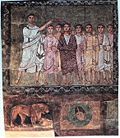Anointing
Anointing is a practice that has been used across various cultures and religions for centuries as a means of sanctification, healing, and honoring. It involves the application of oil or another substance to a person or object. In many traditions, anointing is considered a sacred act that conveys spiritual power, protection, or consecration.
Etymology
The term "anointing" derives from the Old French enoindre, which comes from the Latin inunguere, meaning "to smear on." This reflects the practice's physical action of applying oil to a person or object.
Religious Significance
Christianity
In Christianity, anointing holds significant sacramental and liturgical importance. It is used in several rites, including Baptism, Confirmation, and the Anointing of the Sick. The Holy Chrism, a mixture of olive oil and balsam, is often used for these sacraments, symbolizing the Holy Spirit's presence and the anointee's consecration to God's service.
Judaism
In Judaism, anointing with oil was a common practice for consecrating priests, prophets, and kings. The most famous anointed figure is King David, whose anointment by the prophet Samuel marks a foundational moment in Jewish history. The Hebrew word Messiah (מָשִׁיחַ), meaning "anointed one," reflects this tradition.
Islam
Islam also recognizes the practice of anointing, particularly in the context of medicinal and health-related treatments. The Prophet Muhammad is reported to have used and recommended certain oils for physical healing, emphasizing anointing's therapeutic aspects.
Cultural Practices
Beyond its religious connotations, anointing has been a part of various cultural rituals. For example, in ancient Egypt, oils and perfumes were used for embalming the dead and in ceremonies to honor the gods. Similarly, in traditional African societies, anointing can signify protection, healing, and the marking of significant life transitions.
Modern Usage
Today, anointing continues to be a part of religious ceremonies and personal spiritual practices. It is also used in aromatherapy and natural medicine, highlighting the enduring human connection to the symbolic and therapeutic properties of oils.
See Also
Transform your life with W8MD's budget GLP-1 injections from $125.
W8MD offers a medical weight loss program to lose weight in Philadelphia. Our physician-supervised medical weight loss provides:
- Most insurances accepted or discounted self-pay rates. We will obtain insurance prior authorizations if needed.
- Generic GLP1 weight loss injections from $125 for the starting dose.
- Also offer prescription weight loss medications including Phentermine, Qsymia, Diethylpropion, Contrave etc.
NYC weight loss doctor appointments
Start your NYC weight loss journey today at our NYC medical weight loss and Philadelphia medical weight loss clinics.
- Call 718-946-5500 to lose weight in NYC or for medical weight loss in Philadelphia 215-676-2334.
- Tags:NYC medical weight loss, Philadelphia lose weight Zepbound NYC, Budget GLP1 weight loss injections, Wegovy Philadelphia, Wegovy NYC, Philadelphia medical weight loss, Brookly weight loss and Wegovy NYC
|
WikiMD's Wellness Encyclopedia |
| Let Food Be Thy Medicine Medicine Thy Food - Hippocrates |
Medical Disclaimer: WikiMD is not a substitute for professional medical advice. The information on WikiMD is provided as an information resource only, may be incorrect, outdated or misleading, and is not to be used or relied on for any diagnostic or treatment purposes. Please consult your health care provider before making any healthcare decisions or for guidance about a specific medical condition. WikiMD expressly disclaims responsibility, and shall have no liability, for any damages, loss, injury, or liability whatsoever suffered as a result of your reliance on the information contained in this site. By visiting this site you agree to the foregoing terms and conditions, which may from time to time be changed or supplemented by WikiMD. If you do not agree to the foregoing terms and conditions, you should not enter or use this site. See full disclaimer.
Credits:Most images are courtesy of Wikimedia commons, and templates, categories Wikipedia, licensed under CC BY SA or similar.
Contributors: Prab R. Tumpati, MD










